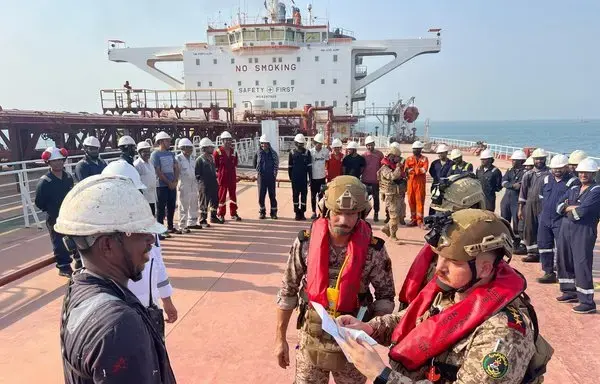Security
Iran's shadow fleet uses Iraqi oil routes to fund destabilization, experts warn
Tehran exploits Iraqi oil infrastructure to circumvent sanctions and finance destabilizing activities, prompting Baghdad to tighten enforcement.

By Anas al-Bar |
Iran is using Iraq's oil export infrastructure and a covert 'shadow fleet' to disguise Iranian crude as Iraqi oil, generating revenue to fund regional destabilization and forcing Baghdad to ramp up protections against potential sanctions, security experts told Al-Fassel.
The Iranian regime operates a large fleet of aging tankers that evade detection by flying flags of convenience from countries such as Panama and Liberia, registering through shell companies, and disabling tracking systems.
These vessels operate covertly at export terminals like Iraq's Khor al-Zubair port, where Iranian crude is blended with legitimate Iraqi shipments before being sold to international buyers with forged documentation.
The scheme lets Iranian oil enter global markets at premium prices, often without buyers knowing they are purchasing sanctioned crude, the experts said.
Sanctioned facilitator
On July 3, the US Treasury Department sanctioned Iraqi-British businessman Salim Ahmed Said, whose UAE-registered company VS Oil Terminal operates six storage tanks at Khor al-Zubair Port.
Said's operation has smuggled Iranian oil disguised as Iraqi crude since at least 2020, using forged export documents to bypass sanctions.
VS Oil employees transport millions of dollars in cash into Iran as payment for the illicit oil shipments, the Treasury said, helping Tehran circumvent international banking restrictions and secure untraceable funds for covert operations.
With the Islamic Revolutionary Guard Corps (IRGC) controlling roughly 50% of Iran's oil export revenues, "it has established a firm grip on Iran's energy sector and developed methods to circumvent sanctions and exploit this illicit trade to its advantage," Iraqi strategy expert Tareq al-Shammari told Al-Fassel.
"The IRGC operates through multiple transportation networks, front companies, ship operators, and brokers to transport and sell Iranian oil outside the sanctions regime," he explained.
This financial base allows Tehran to sustain its proxy network and fund destabilizing activities across the Middle East.
Iraqi response
Baghdad's efforts to protect its energy sector were evident in the seizure and release of the Liberian-flagged tanker "Liliana" near Basra in early August.
The vessel carried about 93,000 metric tons of fuel oil, reportedly of Iraqi origin and possibly being smuggled out of the country, Iraqi naval and oil ministry sources told Reuters.
While a court cleared the vessel of wrongdoing, the incident highlights Iraq's increased vigilance in monitoring its waters and exports to prevent illicit exploitation, the experts told Al-Fassel.
Al-Shammari said targeting smuggling routes would hurt the IRGC's finances but warned that, without a clear plan, sanctions could also affect Iraqi institutions and the economy.
He called the ongoing exploitation of Iraqi oil infrastructure a major threat to the country's "sovereignty and reputation," and urged stronger monitoring and accountability at export ports to protect national interests and prevent further infiltration.
Iraq - Iranian domination
Excellent
Very good
This is Iran and the Iranian government, since day one they have been traitors and greedy. Some Iraqis have given them leeway. Iraqis are dying of hunger, and they are the people of oil and resources. Look how far the world has come while Iraq is going backwards.
Is Iraq today Iraq? No, by God, it is not even considered a country. Go and see how other countries have become and developed, while we are moving backward. I feel sorry for you and cry for this oppressed people who are not supported by anyone, and all the countries take from them and do not give to them. I will not say anything except, “Allah is sufficient for me, and He is the best Disposer of affairs.” May the peace, mercy, and blessings of Allah be upon you.